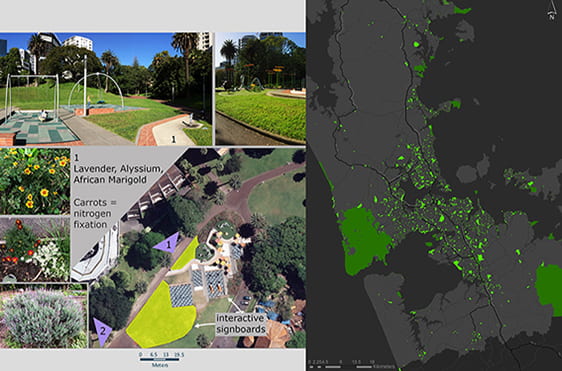Regenerative Urban Design: coupling food reconnection with pollinator biodiversity in the public space

Humanity is facing pressing sustainability challenges, and land is at the heart of both the conundrum and hopeful pathways for change. Urbanised, publicly owned land is a precious resource that often functions as ornamental landscapes or parking in Aotearoa. This research aims at implementing a regenerative design strategy to activate urban public spaces into dynamic knowledge platforms,
growing edibles that may reconnect urban people with food processes and other elements of native biodiversity while supporting populations of pollinators. This twofold purpose is at the heart of the PI’s research agenda (Ribeiro 2019; Ribeiro 2020a; Ribeiro 2020b; Ribeiro and Lewis 2021), which articulates urban design, biodiversity, and food reconnection.
The PI has been refining an urban design strategy for replacing parts of ornamental landscapes on publicly owned land with edibles that could feed both humans and pollinators. Auckland Council used Ribeiro’s ideas (2019, 2020a, 2020b) to substitute parts of Monarch Park’s ornamental landscape for edibles. This starting point is significant because it proves that change is possible and financially inexpensive provided there is political will.
Publications:
Ribeiro, B. 2019. From Food Consumption to Eating Awareness. Focus: the journal of planning practice and education 15(1), pp. 56–66. https://digitalcommons.calpoly.edu/focus/vol15/iss1/14/
Ribeiro, B. 2020a. Circular Place-making in Auckland: Enhancing pollinators’ biodiversity and food awareness. Auckland Council., pp. 4–5. Available at: https://knowledgeauckland.org.nz/media/1344/mrq-12december-2019.pdf
Ribeiro, B. 2020b. Sustainability Transitions in New Zealand: Mainstreaming alternative food values. PhD Thesis, Auckland, New Zealand: The University of Auckland. Available at: https://researchspace.auckland.ac.nz/handle/2292/53687
Ribeiro, B. and Lewis, N. 2021. Urban food forestry networks and Urban Living Labs articulations. Journal of Urbanism: International Research on Placemaking and Urban Sustainability 0(0), pp. 1–19. https://www.tandfonline.com/doi/full/10.1080/17549175.2021.1906731